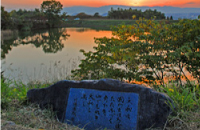Episode 9:
Yamatotakeru no Mikoto, the Unfortunate Hero
From the Kojiki, Volume II
“Emperor Keiko”
The story of Yamatotakeru no Mikoto is one of the best-known stories from the Kojiki. Ousu no Mikoto, son of Emperor Keiko, was a very rough-natured boy. The emperor was afraid of his misbehavior and ordered him to conquer the Kumasotakeru brothers in the west. Young Ousu no Mikoto set out for the west accompanied by only a few soldiers.
The house of the brothers was heavily guarded, so he used his wits to gain access. He let his hair down and put on clothes he had received from his aunt. Disguising himself as a girl, he successfully slipped into the house. A feast was being held, during which the brothers were utterly enchanted by their beautiful visitor. Ousu no Mikoto immediately seized the chance to stab the older brother to death. On seeing this, the younger brother ran off, but was held at bay. He praised Ousu no Mikoto's bravery, and presented him with the name "Yamatotakeru".
Thus, Yamatotakeru no Mikoto achieved a brilliant success, but the Emperor didn’t appreciate his exploits, and again ordered him to go and subdue his enemies, this time in the east. Yamatotakeru no Mikoto complained to his aunt in tears: “Does my father seek my death? As soon as I returned from the west, he dispatched me to the east without soldiers. Maybe he doesn't want me to live much longer.”
His journey to conquer the east was a succession of hardships. In Sagamu-no-kuni (now Kanagawa Prefecture), a local governor attacked and entrapped him by setting fire to the plains he was on. At Hashirimizu-no-umi (known as the Uraga Strait today), the sea-deity blocked his way by raising rough waves. At that time, his wife, Ototachibanahime no Mikoto, threw herself into the sea for him in order to calm the waves for him, expressing her dying wish saying, “I hope that you successfully complete your duties and return home soon.”
Later, Yamatotakeru no Mikoto pacified warlike deities and people of the east. On his way back to the capital, he tried to defeat the deity of Mount Ibuki. However, he was caught in a heavy hailstorm and became ill. He kept on heading for the capital despite being on the verge of death, but finally collapsed and died at a young age in Nobono (now Mie Prefecture), leaving several poems.
My hometown, Yamato
Beautiful place
Surrounded by mountains upon mountains
Like a layer of green hedges
Oh, my sweet hometown
Who knows what lay deep inside his heart: nostalgia for his hometown or frustration at his father?
The soul of this unfortunate hero is said to have transformed into a big white bird, which soared up into the sky and flew off to the west.
Related tourism site:
Monument inscribed with his poem near Idera Pond at Hibara-jinja Shrine, Miwa, Sakurai City
Yamatotakeru no Mikoto’s last poem yearning for his hometown is inscribed on a stone monument. The characters were written by Yasunari Kawabata. From the bank, people can see exceptionally beautiful sunsets behind Mount Nijo.
